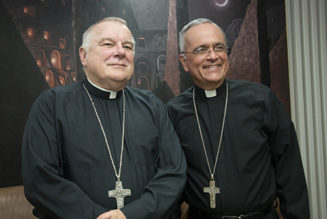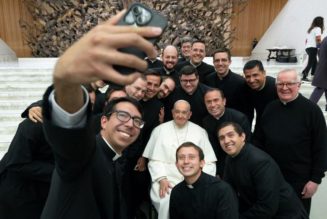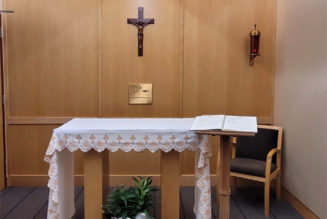
I forget who originally came up with the term “Romeaphobia.”
This can be defined as the hatred or fear of all things that can be viewed as links to Roman Catholicism or the early church in general. Obviously, this affects issues linked to worship and church governance. However, in my experience (I grew up in Texas), many evangelicals (especially Baptists) have a fear of clear, authoritative doctrinal statements that, you know, might be interpreted as “Roman” creeds. All together now: We are “Bible Christians” and that’s that.
I am not saying this to take a shot at my heritage (I am very thankful for the deep faith and examples of my family and my father was a Southern Baptist pastor). The reason I mention this up is because, in my opinion, this anti-creedal Romeaphobia is playing a major role in an important news story all over America. This was the hook for this week’s “Crossroads” podcast (CLICK HERE to tune that in).
Does this USA Today headline sound familiar? It should, for readers from sea to shining sea: “Christian Florida school tells parents gay and transgender students must ‘leave immediately’.”
My goal here is to offer advice to reporters who want to do accurate, fair-minded coverage of these church-state skirmishes (let’s hope there are some out there). I’m also offering press-relations advice to terrified leaders of Christian schools at all levels, from kindergartens to colleges. The Romeaphobia angle? That takes us into legal nuts-and-bolts questions about these conflicts.
Let’s start with the rather familiar USA Today overture:
A Florida-based Christian school sent out an email informing parents that LGBTQ-identifying students “will be asked to leave the school immediately.”
According to the email obtained by NBC News, the top administrator of Grace Christian School in Valrico, Florida, Barry McKeen, sent the email to the families for the kindergarten-grade 12 school on June 6. He later confirmed and doubled down on the policy in an Aug. 18 video on the school’s official Facebook page.
The June email read: “We believe that any form of homosexuality, lesbianism, bisexuality, transgender identity/lifestyle, self-identification, bestiality, incest, fornication, adultery and pornography are sinful in the sight of God and the church. Students who are found participating in these lifestyles will be asked to leave the school immediately.”
For starters, private schools — liberal and conservative — have First Amendment rights, including the right to clearly state their foundational doctrines and, thus, disciplines that apply to staff, faculty and students. Tip No. 1 for reporters and church leaders: Get to know the details of the UNANIMOUS 2011 U.S. Supreme Court decision commonly referred to as the Hosanna Tabor case.
But we need to figure out what actually happened in this Florida case. Here is a crucial passage, and I have added bold type linked to the crucial questions that remain:
The school’s policies are not new policies, however, the email enforcing them is. Parents were informed through the June email they must sign documents complying with the standards before students may enroll this month. In the August Facebook video, McKeen said: “It is true that a student can not come to our school … and be transgender or homosexual. This is rooted in scriptures. … we have had these policies in our school since day number one in the early 1970s.“
OK, it would be very good if, at this point, the story quoted the 1970s era statement of these points of doctrine. I promise you that the school has that stashed away somewhere in archives (lawyers should insist that these are available) and, if school officials cannot provide that, this raises a red flag.
But here is the most important question: Over the decades, or even in recent years, have parents (and even students) been required to sign a doctrinal or “lifestyle” covenant when choosing — that’s a big word with voluntary associations — to attend this school?
Reporters need to ask: Was this email blast the first time that these school administrators have clearly communicated these doctrines and their link to school policies? When did this doctrinal statement enter the school’s printed or online student/family handbook?
Turning to an NBC story on this case, we can see quotes suggesting that these tough questions are relevant. Read this carefully:
NBC News first obtained an email from the Grace Christian School administrator in June that outlines the school’s human sexuality policies. It told parents that they had to agree with the policies before their students could start the new school year.
“From what I read it is not a new policy, but that was the first time I was made aware of that policy,” the mom said.
All of her children have attended the Grace Christian School in Valrico, but after reading the email from administrator Barry McKeen, she said she couldn’t send her youngest daughter back there for her junior year.
“I actually respect their opinion,” she said, “but my daughter’s wellbeing, right, and mental health is more important.”
Wait. This whistleblower mom has had several children in this school for a total of X-number of years and this is the first time she has heard this doctrinal stance articulated?
Once again: Do parents sign a document, when children are enrolled, that includes a clear notice that they are expected to affirm, or at least not openly oppose, the doctrines and disciplines that define this faith-based academic community?
Obviously, there are reporters who see these conflicts as good vs. evil “gotcha” stories. I understand that. However, it helps to know the key questions that journalists should ask in order to write accurate, fair-minded stories that explore the rights of people on both sides of these First Amendment clashes.
Back to the Romeaphobia angle. In my experience, the administrators of many evangelical and Baptist schools have, for years, assumed they could state — buried somewhere inside a handbook — that the school affirms “biblical values” or that discipline policies are “biblically based” and that was that.
Why be vague? Why assume that modern Americans know what that means? For starters, many administrators may want to cast as wide a net as possible seeking higher enrollments. They may even say their goal is to evangelize the lost. And they may fear, as I have suggested, even the appearance that they have a catechism or creed, thus undercutting their approach to the “priesthood of every believer.”
But vague language will not cut it in American public life, these days. Administrators need to be honest and, well, safe.
With this in mind, here is my check list for journalists covering these stories (and, let me stress, for religious leaders who should be prepared, for legal reasons, to answer tough questions):
* Get print copies of the school’s doctrinal statements and handbooks. Were there earlier versions of these texts? Compare and contrast.
* Ask if parents/students sign a doctrinal statement when enrolling. Do they sign at the start of every school year?
* Create a timeline. When, in the life of this school, did parents start signing lifestyle and doctrinal covenants?
* Compare this specific school’s covenant with those of others in the newsroom’s market. Compare Catholic and Protestant documents, for example.
* Seek out the doctrinal and discipline doctrines of “liberal” faith-based schools. What demands do these administrations make on students and families?
Let me offer, in conclusion, one example of this final point — from a 2014 “On Religion” column about a clash (one of many) between the InterVarsity Christian Fellowship and the leaders of an elite private school, in this case Vanderbilt University, which has Methodist roots.
The headline: “The new campus orthodoxy that forbids most old orthodoxies.” Yes, the IVP leader that I quoted is now an online New York Times columnist (who should be promoted):
… Some conservatives called this struggle another war between faith and “secularism.” In this case, that judgment was inaccurate and kept many outsiders from understanding what actually happened, according to the Rev. Tish Harrison Warren, an Anglican minister who worked with InterVarsity Christian Fellowship at Vanderbilt during the dispute.
“What Vanderbilt did affirmed the beliefs of some religious groups and rejected those of others. That isn’t secularism. Vanderbilt established that there is an orthodoxy on the campus, which means that it has taken a sectarian stand,” said Warren. …
“The university established some approved doctrines and now wants to discriminate in order to defend them. … As a private school it has every right to do that,” she added, reached by telephone. Meanwhile, conservative Christian schools “have their own doctrinal statements, but they’re very upfront about that. Students who go to those schools know what they’re getting into. The question is whether Vanderbilt will be just as candid and tell students about these new limitations on free speech, freedom of association and freedom of religion” on campus.
In other words, liberal schools are also expected to be candid when informing students and their families about campus doctrines and policies and the limits placed on behavior and even speech.
Private schools have the right to state and defend their core doctrines, even in discipline and employment policies. But have these schools been honest? Do they give parents and students a chance to sign, or not sign, on the dotted line after hearing clear descriptions of the consequences?
Enjoy the podcast and, please, pass it along to others.
FIRST IMAGE: Uncredited illustration with a “Sign on the Dotted Line” feature on the website of the Offit-Kurman law firm in Maryland.
Join Our Telegram Group : Salvation & Prosperity









